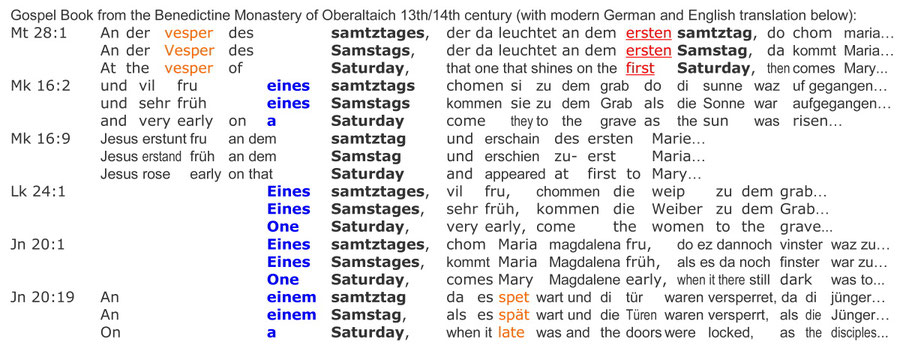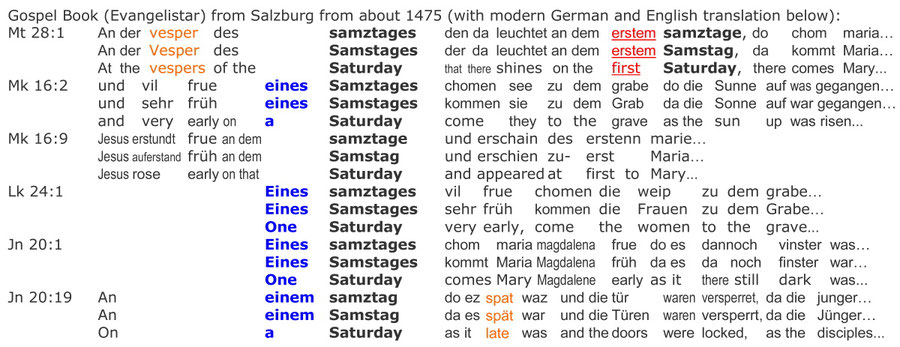- Home
- English
- Structure of the Bible
- Structure of the Menorah
- Ancient Menorahs
- Calendar and Feasts
- Resurrection on Sabbath
- Introduction
- Day
- Sabbath
- High Sabbath
- Pre-Sabbath
- Week
- Interlinear Bible
- Church Opinions
- 1. No Sunday
- 2. A Sabbath
- 3. No Friday
- 4. Intermediate Day
- 5. Three Days and Three Nights
- 6. Manipulations
- 6.1 Sabbath not Sunday
- 6.2 Plural σαββατων not week
- 6.3 one not first
- 6.5 Day of the Sabbaths
- 6.7 Lords Day
- 7. Old Bibles
- Greek Bibles
- Latin Bibles
- Gothic Bible
- English Manuscripts
- English Bible Prints 1
- English Bible Prints 2
- English Bible Prints 3
- English Bible Prints 4
- German Manuscripts
- German Bible Prints 1
- German Bible Prints 2
- Spanish Bibles
- Italian Bibles
- Swedish Bibles
- Czech Bibles
- μια των σαββατων
- Mt 28-1
- Mk 16-2
- Mk 16-9
- Lk 24-1
- John 20-1
- John 20-19
- Acts 20-7
- 1Cor 16-2
- Lk 18-12
- 7 Languages
- Palm Sabbath
- Omer
- Summary
- The Rapture
- Rabbi Kaduri Note
- 666
- 888
- Video
- Info
- Historic Bibles Facsimiles
- Francais
- Deutsch
- Espanol
- Dutch
- Ελληνική
- Pусский
- Introduction
- Day
- Sabbath
- High Sabbath
- Pre-Sabbath
- Week
- Interlinear Bible
- Church Opinions
- 1. No Sunday
- 2. A Sabbath
- 3. No Friday
- 4. Intermediate Day
- 5. Three Days and Three Nights
- 6. Manipulations
- 6.1 Sabbath not Sunday
- 6.2 Plural σαββατων not week
- 6.3 one not first
- 6.5 Day of the Sabbaths
- 6.7 Lords Day
- 7. Old Bibles
- Greek Bibles
- Latin Bibles
- Gothic Bible
- English Manuscripts
- English Bible Prints 1
- English Bible Prints 2
- English Bible Prints 3
- English Bible Prints 4
- German Manuscripts
- German Bible Prints 1
- German Bible Prints 2
- Spanish Bibles
- Italian Bibles
- Swedish Bibles
- Czech Bibles
- μια των σαββατων
- Mt 28-1
- Mk 16-2
- Mk 16-9
- Lk 24-1
- John 20-1
- John 20-19
- Acts 20-7
- 1Cor 16-2
- Lk 18-12
- 7 Languages
- Palm Sabbath
- Omer
- Summary
German Bible Manuscripts show the resurrection of Jesus on a Sabbath
In no other language area was the resurrection of Jesus "on a Saturday" or "on a Sabbath" morning formulated so precisely and clearly as in the German language (for links to the original bibles see Link). Also the temporal distribution of this statement over many centuries is worldwide unique. For centuries, Germany was the land of the Bibles and was an important contributor to the spread of the Gospel. There were over 150 German translations, some of which have survived. The following list is not complete because there are more Bibles, but they have not yet been digitized or they are not yet known to us. The German-speaking Christians were particularly blessed, since excellent and very accurate Catholic and Protestant Bibles were produced in various places. First the Latin Bible (Vulgate) was used as the basis for translation. The Vulgate describes in the resurrection chapter of the NT a coming of women to the tomb "on a Sabbath" morning. Therefore, the first German Bibles also spoke of the Saturday or Sabbath resurrection of Jesus. In concrete terms, this means that for centuries it was not even possible to find a single Bible that spoke of an alleged Sunday resurrection of Jesus, since the Catholic Bibles only mentioned the Saturday morning. So anyone who claims today that the Vulgate supposedly speaks of Sunday must explain why all the scholars and language experts for many centuries had completely different opinions and only mentioned Saturday/Sabbath as Jeus' Resurrection Day? Especially the statements of the old Bible manuscripts are sensational and very easy to understand. The introduction of Sunday into the Bibles only took place more than 1,500 years after the Apostles had written the New Testament. Since the Vulgate in Mt 28:1b speaks of the first (instead of a/one) Sabbath, many translators have also translated in this way. But that is not a problem at all, since in this case it is actually the first of the 7 Sabbaths until Pentecost, as Mk 16:9 clearly proves. So the translation of the Greek basic text in Mt 28:1b was not quite correct in the Vulgate, but the content is still correct, because it means just this "first Sabbath" and not the "first day of the week" or "on a Sunday". Many old Catholic Bibles teach the resurrection of Jesus "on a Saturday morning."
Bible Manuscripts in German Language
The oldest Germanic Bible is the Bible of the Goths (350-380 A.D. see Gothic Bible), which was already written before the Latin Vulgate (382 A.D.). From 800 A.D. onwards, several German translations were produced, which were laboriously handcrafted by monks or specially trained Bible painters. It is assumed that there were over 150 German translations before Luther, although many of these have been lost over the centuries. Only a few Christians today know that their brothers and sisters in faith who lived in the Middle Ages could read in the German-language manuscripts of the New Testament that Jesus did not rise from the dead "on a Sunday" but "on a Saturday" (or "on a Sabbath"). These Catholic statements are sensationally clear! This is not surprising, since the Vulgate, with its clear statements in the chapter on the resurrection, was usually correctly translated into German. At that time, translators knew the Latin language from childhood, so they were experts in understanding the Latin Bible texts. All these Catholic (!) Bible manuscripts report about the resurrection of Jesus "on a Saturday" (or "on the Sabbath"). On the other hand, freely formulated Catholic gospel books and short Bibles for the poor were also published, in which the church doctrine (Good Friday/Easter Sunday) was spread.
Although the statements of the Bible are so easy to understand, the Church has reinterpreted the words of the Bible by saying that only in the chapter on resurrection the so-called "Christian Sabbath" (i.e. Sunday) is meant, while in all other Bible passages the "Jewish Sabbath" (Saturday) is meant. No, there is only one Sabbath and that is the biblical Sabbath from Friday evening to Saturday evening (see definition). The "Sunday" was never a "Christian Sabbath", but it is a pagan "first day of the pagan week", which is counted from midnight until midnight again. And many Bibles even say that the women came to the tomb "on a Saturday" morning. And Saturday, of course, never means Sunday. The world hates the Sabbath and the truth, so it tries everything to twist the words of the Bible to get to the desired pagan Sunday holiday. Because if Jesus had not risen on a Sunday, no Christian would sanctify Sunday and accept the worldly calendar. So a lie became the foundation for the acceptance of the old pagan holidays. To do this, the sign of the Messiah (see Link), the most important sign in the history of the universe, had to be denied by Christians and the words of Jesus were even twisted by many pastors, just to defend the unbiblical Sunday (which was not mentioned once in the entire Bible) and to break away from the calendar of God.
Old High German Tatian 830 A.D.
This harmony of the Gospels (info and facsimiles; German: Althochdeutscher Tatian) does NOT report in the Latin and Old German languages about the resurrection of Jesus "on a Sunday (Latin dies solis; Old German sunnun tag)", but rather "on a Saturday" (Old High German: sambaztac, sambaztag; Latin: sabbati). Question: When did "the Savior (ther heilant)" come to the disciples? Answer: "that same day, a Saturday". Every German child understands this. This is also one of the many proofs that clearly shows that even from 1,200 years ago, people could always clearly differentiate in Latin and German texts between one/first and between Saturday, week and Sunday, knowing exactly what they were saying and what they were not saying. Nonsense phrases like "on the first day of the week" or "on a Sunday" were not used in the NT. Even Lk 18:12 has been translated excellently. The original Latin and Old German texts of the Gospel harmony follow, with the translation in modern German and English below:
Beheim's Gospel Book 1343
Matthias von Beheim's Gospel Book 1343 (Info and facsimiles; German: Matthias von Beheims Evangelienbuch). The word "Sabbath" does not appear in the entire Gospel, but the old Middle German equivalent sunabint (Sonnabend = the former designation for Saturday, e.g. in Mt 12:1,2,5,8,10,11,12 etc.). The translator was able to differentiate exactly between the words one and first, so he spoke of what happened "on a Saturday", except in the two places where the Vulgate speaks of the first Sabbath (Mt 28:1b; Mk 16:9) of the seven Sabbaths until Pentecost. All this is a warning example to all translators of the world that both the evangelists in their Greek text and the Catholic Jerome in his Latin Vulgate, as well as Beheim in the old Middle German language knew exactly what they were saying. They all spoke of a resurrection event "on a Saturday morning". Since the Greek text was not available to the translator, he inevitably had to accept the error of understanding of Hieronymus in Mt 28:1b, who speaks of the "first Sabbath" and not of the transition from the dark phase to the light phase on "a Sabbath". This is why the German Christians, too, found it difficult to understand Mt 28:1b. Very interesting is the comparison between the first and the second verse of Mk 16, because the women bought the spices "after Saturday", but they came again "on a Saturday" to the tomb. No, not a week has passed in between, because those who are familiar with the biblical calendar can easily understand this apparent contradiction, namely that there are 3 Sabbaths within a Passover week (explanation: Link). These are the two annual High Sabbaths on the 15th and 21st Nisan with the one ordinary small weekly Sabbath ("Saturday", 17th Nisan) in between:

We do not know whether Beheim knew the biblical order of the Calendar and whether he really understood what Matthew meant, but he knew that the women came to the tomb "on a Saturday" morning and that Jesus appeared to the disciples "when it was late on a Saturday". In 1867 Reinhold Bechstein published a printed version of this original manuscript which was kept in the Leipzig University Library. Since then it has been available to a broad readership. The "week" was only mentioned in Lk 18:12 and that is very important because we have the double security that Beheim did not mean the word "week" at the other verses. In this Catholic gospel all German Christians can read that the women came to the grave "on a Saturday morning" and not "on a Sunday morning". So it is about the resurrection of Jesus on Saturday morning:

Augsburg Parchment Manuscript 1350
The Augsburg parchment manuscript (info and facsimiles; German: Augsburger Pergamenthandschrift) is a Bible translation from the Vulgate. Therefore the error of Hieronymus in Mt 28:1b was automatically taken over, which speaks of the "first Sabbath" instead of "a Sabbath". Nevertheless, the text is sensational because it clearly confirms the resurrection of Jesus "on the Sabbath" (Lk 24:1) or "on a Sabbath" (Mk 16:2; Jn 20:1), "on the first Sabbath" (Mk 16:9; Mt 28:1) and even "on a Saturday" (Jn 20:19). It could not have been expressed more clearly, there was never any talk of "a Sunday". At that time Latin was the mother tongue of the educated, so they knew exactly how to translate the Vulgate into German. Today, many who learn Latin in school do not understand the linguistic context and then begin to interpret (not translate) it, so that the Sabbath (which many theologians hate) is erased and the pagan word "Sunday" is used (the hoiday of the sun god of the gentiles). But the old Bibles were more accurate. Only in Acts 20:7 and 1Cor 16:2 did the translators generally speak of "a day of the week" without mentioning exactly which one they meant. But this can also mean the Sabbath, because it is also a day of the week. John 20:1 is literally translated as "but on a Sabbath, early comes Mary", John 20:19 as "on a day of Saturday" and Mk 16:9 as "on the first Sabbath" in perfect German (the German word "Sabbats" in the singular genitive, which is the same as in the Greek basic text of the NT):
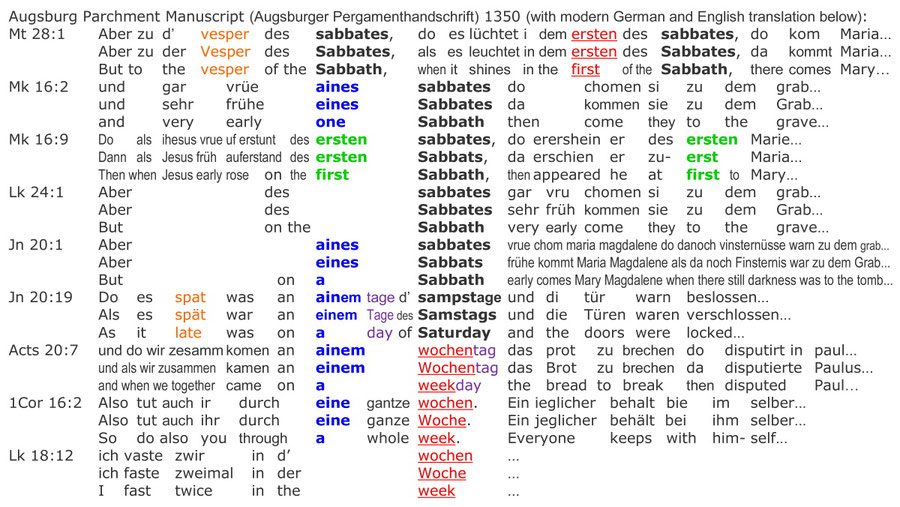
Gospel Book from the Benedictine Monastery Oberaltaich 13th/14th century
The Gospels for the whole year (info and facsimiles; German: Evangelistar aus dem Benediktiner-Kloster Oberaltaich; BSB Cgm 66). This catholic handwriting is sensational, because the Vulgate was translated correctly in all places. Church doctrines were not observed, so there is always talk of the resurrection of Jesus "on a Saturday" morning. A distinction was made between "one" and "first" in the Vulgate text. In the Middle Ages Latin was the church language, so the translators were experts and knew exactly what the Vulgate says and what not. The Latin word "una sabbati", which was always used before the actual translation in the text as headline, means "on a Saturday" and not "on a Sunday" nor "on the first day of the week". Mk 16:9 states that "Jesus rose early on the Saturday". Are there any more questions about this? The Vulgate cannot mean two days at the same time, but only one, and that is clearly Saturday:
Veit-Kloz Gospel Book 14th century
Title: "The Gospels and Epistles for the Whole Year" (info and facsimiles; German: Veit-Kloz-Evangelistar). In the 16th century this writing belonged to Veit Kloz, whose name is registered (Shelfmark: BSB Cgm 58). This Catholic translation is very good, it shows the resurrection of Jesus Christ "on a Saturday" morning and not "on a Sunday" morning. This should be the teaching of the Catholic Church:
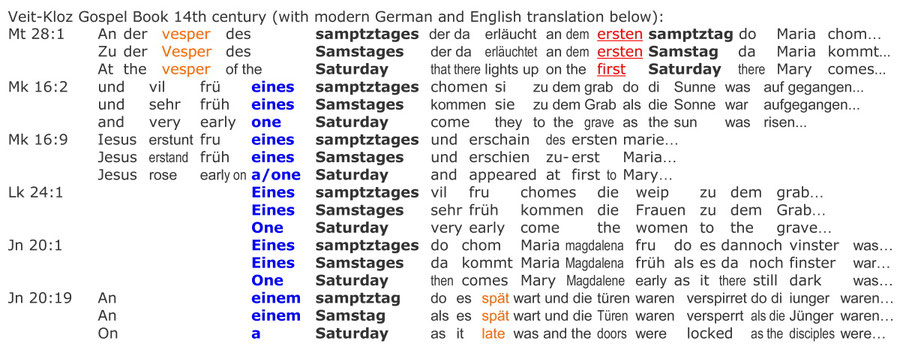
Gospel Book Cod. Lichtenthal 30 from the 14th century
Original German manuscript on parchment, published in Bavaria (Evangelistar = Gospel Book; info and facsimiles). Contains: Evangelist and Lichtenthaler Mary's lament (Marienklage). Writing language is Bavarian (Karlsruhe, Landesbibliothek, Cod. Lichtenthal 30). What is the content of this Catholic book? When did the women come to the grave? "On the first day of the week? No. On a Sunday? No, it was "on a Saturday" morning. In other words: "Jesus rose early on that Saturday and he appeared first to Mary" (Mk 16:9) and "on a Saturday, as it late was, he appeared to the disciples" (Jn 20:19):
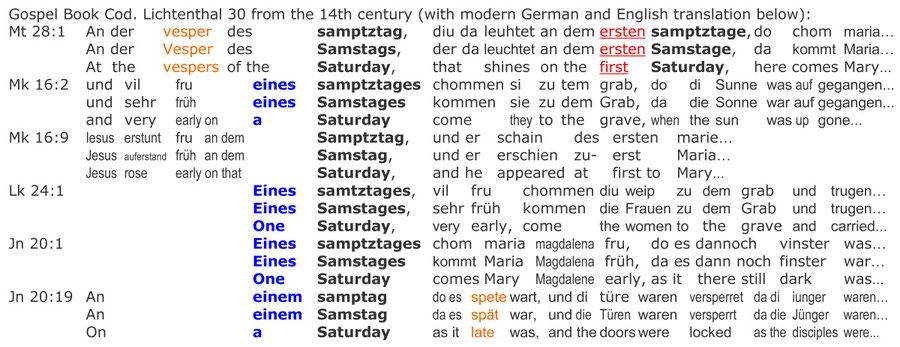
German Evangelistar (Gospel Book) ca. 1380
This manuscript (info and facsimiles), written in the North Rhine-Franconian dialect (Uni Frankfurt, Ms. germ. qu. 55), clearly shows which problems the theologians had with the statements of the Vulgate. The Vulgate speaks of the resurrection of Jesus "on a Saturday/Sabbath." But since the respective texts were to be read out on certain catholic Sundays and other catholic holidays (e.g. Easter, feasts of Mary and the Apostles, All Saints' Day, etc.), the text was not always translated literally, but simply reinterpreted so that the church would believe in the resurrection of Jesus on Sunday. It should be noted here that in Lk 24:1 the Vulgate uses exactly the same words as in John 20:1, namely "una sabbati." It is therefore completely impossible that it should mean "on a Saturday" and then "on a Sunday" (German: suntag, Sonntag), that means two different resurrection days. Thus the deliberate manipulation of the translators becomes clear, whose work has created only contradictions and chaos. But Mt 28:1, Mk 16:2 and John 20:1 were correctly translated. So Jesus rose from the dead "on a Saturday" morning:
World chronicle with Gospel pericopes of the Passion 1385
World Chronicle (German: Weltchronik mit Evangelien-Perikopen der Passion; info and facimiles). Language: Middle High German. Authors: Rudolf von Ems, Jansen Enikel, Jans Philipp von Seitz, Gregorius Koehler (University Library Kassel, Shelfmark: 2° Ms. theol. 4). Perikpopes are passages from the Bible which are intended for reading in church services. Several times the word "Easter" is mentioned, but in one place the resurrection of Jesus "on a holy Saturday" (not "on a holy Sunday") is mentioned. So the Catholic Church originally taught the holy resurrection Saturday. Literally it means in the form of a poem:
"On the Holy Saturday.
On a Saturday that happened, then Easter is also called.
Mary Magdalna and the other Maries came to see the tomb...".
So this means: "on a holy Saturday Mary came to the tomb". Who has problems to understand this catholic definition?
Evangelistar (Gospel Book) from Bavaria at the end of the 14th century
This handwriting in Bavarian dialect is sensationally good (Uni Heidelberg, Cod. Pal. germ. 62, info and facsimiles). The translator was a master. He worked without church dogmas and translated the verses correctly in all places, namely as the Vulgate meant it. At his time Latin was the mother and church language of the educated, so they knew exactly what the Vulgate said and what it did not say. The first Latin words and the German equivalent are often used as headlines. Just here it becomes very clear what the evangelists wanted to say, namely: "vespere autem sabbati" (Mt 28:1) means "evening of Saturday"; "una sabbati" (Lk 24:1) means "on a Saturday"; "una sabatorum" (Jn 20:1,19) means "on a Saturday"; and "mane prima sabbati" (Mk 16:9) means "early on the Saturday". The word "first" is missing (Mk 16:9), because the translator did not know God's calendar and did not know what a "first Saturday" should be. This was the first of the 7 Saturdays counted every year until Pentecost The Vulgate does not mean the "first day of the week" nor "on a Sunday", but "on a Saturday" morning on which Jesus rose from the dead. This is written in many old Catholic Bibles and Gospel Books (Evangelistar). Only in Lk 18:12 there is once again an inaccuracy due to the use of the word "week", because it appeared to be a sin for the people if the Jews should fast on a Saturday:
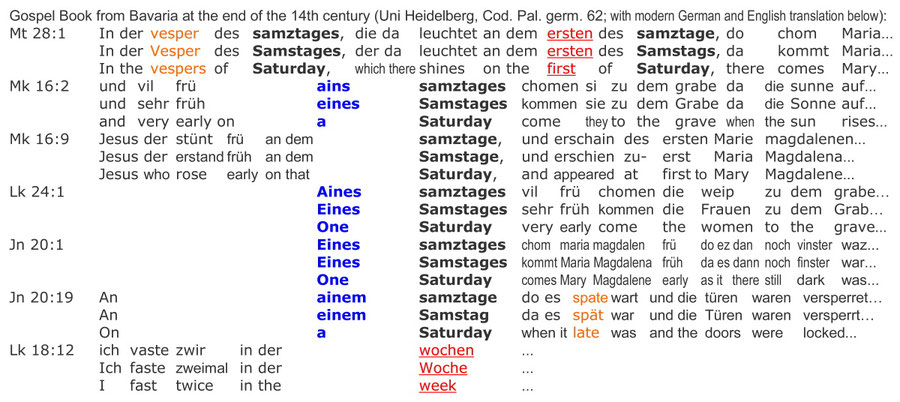
Waldensian Bible = Codex Teplensis 1390
The text of the Waldensian Bible (Waldenser-Bibel; info and facsimiles) served as the basis for the first printed German Bible, the Mentelin Bible of 1466 (Link), which was also the world's first printed Bible in a national language. Since the Waldensian Bible was translated from the Latin Vulgate, the Resurrection Saturday was preserved. At that time, Latin was the church's scriptural and worship language, which almost all church employees understood perfectly. Therefore the translator was an expert and could distinguish (in contrast to many theologians of today) exactly between the words one / first and Saturday / Sunday. But since he was not familiar with the Jewish traditions, he could not understand what the phrase "I fast twice on the Sabbath" in the Gospel of Luke meant. Therefore, he assumed that only at this point the week could be meant. But just the mention of the "week" in Lk 18:12 is very valuable, because it proves that the translator knew exactly what he was writing, namely that the women did not come to the tomb "on the first day of the week", nor "on the day after the Sabbath", nor "on a Sunday", but "on a Saturday". Every little child understands that. Is it even possible to express it more clearly? Jesus rose "on a Saturday morning", or "on the first Saturday" of the seven Saturdays until Pentecost:
Gospels of the Good Masters of Prague around 1400
This manuscript (German: Evangelien der guten Meister von Prag; info and facsimiles) was written around 1400 in Prague and arranged in 1477 in the Benedictine monastery Michelsberg near Bamberg (Germany) together with other earlier texts as a collective writing. Today it is housed in the Staatliche Bibliothek Bamberg, Cod. Lit. 146(B). It contains the pericopes for selected feast days and texts from the OT and NT. At the end there is the text "Here the Gospels have an end, made by the good masters from Prague". Therefore the name for this bad translation was created. Emperor Charles IV (Czech: Karel IV; *1316; †1378) had made special efforts to translate the Bible into German in order to counteract sectarian and Reformation tendencies. Catholic teachings should also be observed and distributed. As in other works, the preparation day is also called "Good Friday". An example: "When evening had come, when it was Good Friday, who is before Saturday, there comes Jesus of Aromathia, a nobleman... He went secretly to Pilate and asked for God's body." The Passover is called "Easter" or "Easter holidays". Since the texts of Jn 20:19; Mk 16:9 and Lk 24:1 were to be read out one week "after Easter" or later, the resurrection of Jesus was postponed from Saturday to Sunday (suntag, Sonntag). Thus there are great contradictions, because according to Mt 28:1 and John 20:1 the women came to the tomb "on a Saturday" (samstag). Here we are not talking about the "first day of the week", but the word "one" or "a" was left correctly in the text, only the day of the week was simply exchanged. Especially the unbiblical mention of Sunday in this text is very important for us, because it shows exactly that all the many other literature sources actually always meant a Saturday. Thus this Prague text differs clearly from the others and much better translations before and after, in which there were no such contradictions. They spoke of the resurrection "on a Saturday morning":
The Ottheinrich Bible 1425/30
The Ottheinrich Bible 1425/30 (German: Ottheinrich-Bibel; info and facsimiles) has many elaborately produced illustrations, but even more important is its text, because it speaks (like the German Bibles before it) of the resurrection of Jesus "on a Sabbath" morning! Although the word "week" was contained several times in this Bible (e.g. Lk 18:12; 1Cor 16:2), the translator avoided explicitly stating the arrival of the women at the tomb as "on the first day of the week". This Bible could also differentiate between "one" and "first" and speaks either of "on a Sabbath" or of "on a day of the Sabbath", that is, of a Sabbath day on which Mary came to the tomb. The translator had an excellent knowledge of the Latin language, as can be proven by the correct translation of numerous verses into German. Mk 16:9 was also correctly translated as "early on the first Sabbath" in the singular genitive (früe ersten sabbats), just as the Greek original text says. By this Mark meant the first of the seven Sabbaths until Pentecost. Also the breaking of bread of the first Christian church took place "on a Sabbath" instead of "on a Sunday". This magnificent Bible manuscript can be downloaded free of charge from the Bayerische Staatsbibliothek via the Internet (see Link). It is an impressive and warning example that people have always been able to translate as God and the evangelists meant. Church interpretations were deliberately omitted. The Ottheinrich Bible was not the Bible of a small Christian group or a religious sect, but the official German Catholic Bible of kings, knights and earls. Even if the common people did not have the opportunity to read it, at least the worldly rulers could learn that the resurrection of Jesus actually took place "on a Sabbath" morning, even if the priests officially taught something else at the Sunday service. Every little German child can understand the biblical statements of this great and very valuable Catholic NT:
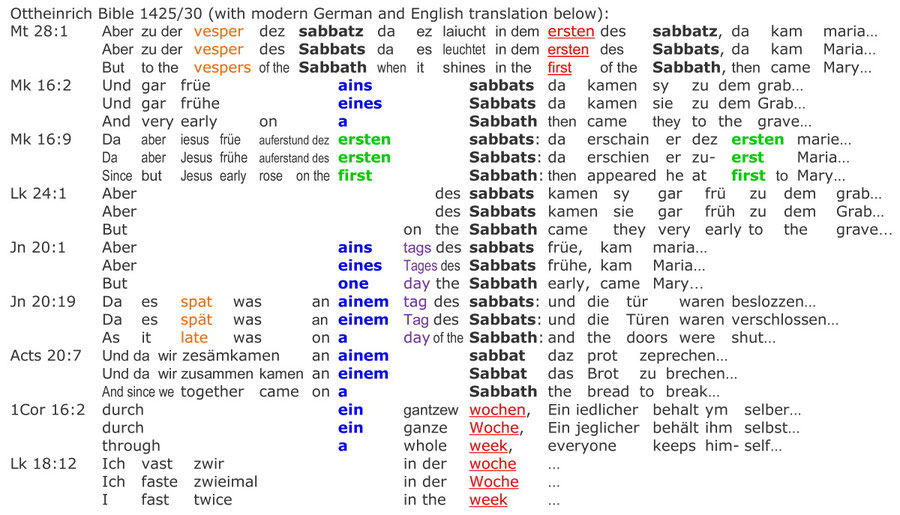
Melker Gospels after 1433
This medieval gospel (Cod. 1084; German: Melker Evangelien; info and facsimiles) comes from the Benedictine monastery in Melk (Austria). The biblical Sabbath is also called "Saturday", "Sonnabend" (other word for Saturday) or "holiday" (e.g. Mk 16:1; Lk 24:1). The Vulgate was also translated here excellently into German, even a distinction was made between the words "one" and "first". There is only one error in Mk 16:9, because here the word "after" was added, although it is not in the text of the Vulgate. Reason: Since the translator did not know the biblical calendar, the expression "first Saturday/Sabbath" was illogical for him. So he thought that the "first day after the Saturday/Sabbath" should be meant. But Mark made no mistake, he actually meant the first Saturday/Sabbath of the seven Saturdays/Sabbaths, which until today are counted every year until Pentecost. Furthermore, Mark 16:1 says that the women prepared the ointments when Saturday had passed and it was not logical for the translator why the women should come to the tomb again "on a Saturday" or "on the first Saturday" (Mk 16:9), because the monk did not know that every year at the Passover there is not only one, but even three Sabbaths (not Saturdays). These are the two High annual Sabbaths on the 15th and 21st Nisan with the one ordinary small weekly Sabbath (Saturday) in between (see illustration below). All other passages correctly speak of the resurrection of Jesus "on a Saturday". So it was clear to the monks that the women biblically came to the tomb "on a Saturday" morning, although the Catholic Church preached orally their coming "on a Sunday" morning or on the alleged "on the first day of the week". No, it was "on a Saturday/Sabbath", only this is what the Bible says in the Greek, Latin and German:
The German New Testament from Franconia 1435
This New Testament from the year 1435 from Franconia has been preserved (German: Franken-NT; info and facsimiles). It becomes very clear that people already knew in the Middle Ages that the biblical resurrection of Jesus could only have taken place "on a Saturday/Sabbath", because that is the statement of the Greek basic text and the Latin Vulgate. At that time Latin was a colloquial ecclesiastical language, so the translators knew very well how to translate the content into German. There were only inaccuracies in a few verses, since the scholars found breaking bread, collecting and fasting "on a Sabbath" illogical or even sinful. Therefore they sometimes mentioned the (in the NT) unbiblical word "week". What counts in our context, however, is that the women came to the tomb "early on a Sabbath" (Mk 16:2; Jn 20:1), "on the Sabbath" (Lk 24:1) and "on the first Sabbath" (Mk 16:9; i.e. the 7 Sabbaths to Pentecost; Mk 16:9). Jesus also appeared "late on a day of Saturday" (Jn 20:19) to his disciples. So it is not about "the first day of the week", nor about "a Sunday". It cannot be said more clearly:

Codex Palatinus Germanicus 1441
The Codex Palatius Germanicus from 1441 (info and facsimiles) shows on which day of the week Jesus rose from the dead and when the women came to the tomb. Since the (unknown) translator did not have the Greek basic text at his disposal (Link), in Mt 28:1b he inevitably adopted the translation error of Jerome ("first Sabbath" instead of "a/one Sabbath") into German. It is clear to him that he did not understand what Hieronymus wanted to say here. Since he also did not know the biblical festval calendar, he omitted a "Saturday" in Mt 28:1b. This Bible translation, more than 570 years old, nevertheless has an invaluable value, because it openly speaks of the resurrection of Jesus "on a Saturday" ("Saturday" was the name for the Sabbath at that time, cf. Lk 23:56) and not "on a Sunday". Every Christian can download this Bible free of charge from the Internet (faksimiles) and see for himself that the Catholic readers in the Middle Ages knew of the resurrection of Jesus "on a Saturday/Sabbath" morning. It is interesting to note that the words "Saturday" and "Sabbath" are mentioned here, but never "the first day of the week". The translators of that time, in contrast to today's translators, could clearly distinguish between the words "one" and "first" in the Latin text. Jesus appeared to the disciples on the evening of a Saturday. We love those Catholic Bibles:

Evangelistar Cod. Lichtenthal 70, around 1450-1452
German Gospel Book (Karlsruhe: Badische Landesbibliothek, signature: Lichtenthal 70; info and facsimiles). It is very important that the "week" was mentioned in Lk 18:12, because it proves that the nun "Sister Regula" (the author) could very well distinguish the "Sabbath" from the "week". It has been correctly translated, but the marginal note in John 20:19 creates confusion because it postpones the resurrection to "the first day after the Sabbath" according to the Church's teaching. So the Bible speaks of a Sabbath morning, but the church interpretation speaks of the day after a Sabbath. But the Bible speaks of the "first Sabbath" of the 7 Sabbaths until Pentecost and never of "the first day after the Sabbath". Since the "first Sabbath" is within the Passover week, the "holiday" (feiertagen, veiertagen) in Mt 28:1 and Jn 20:19 were also mentioned, although it is not in the Vulgate nor in the Greek basic text:

Eberler Bible 1464
This full Bible (German: Eberler-Bibel; info and facsimiles), translated from the Vulgate, is also distinguished by its accuracy. The writer was Johann Liechtenstern, who came from Munich. The coming of the women to the tomb is indicated completely correctly "on a Saturday" or "on the first [of the seven] Saturdays" until Pentecost. Although Liechtenstern could not understand the statement of Hieronymus, who in Mt 28:1 spoke of a mysterious "shining" instead of a normal becoming brighter "on a Saturday" morning, he nevertheless translated correctly and renounced his own interpretations or church dogmas. He could also, in contrast to some theologians of today, clearly distinguish between the words "one" (cardinal number) and "first" (ordinal number) in the Vulgate. Only in 1Cor 16:2 and Lk 18:12 does he generally speak of "a day in the week" (without specifying which day it should be), since for him a gathering or fasting on a holiday did not seem logical, for some theologians it even meant a sin. Also this Catholic Bible never speaks of an alleged "first day of the week" nor "on a Sunday", but only of a resurrection of Jesus "on a Saturday" morning and "on a Sabbath" morning. It could not have been formulated more clearly and all Christian German-speaking readers of all generations (from infants to grandparents) have understood this:
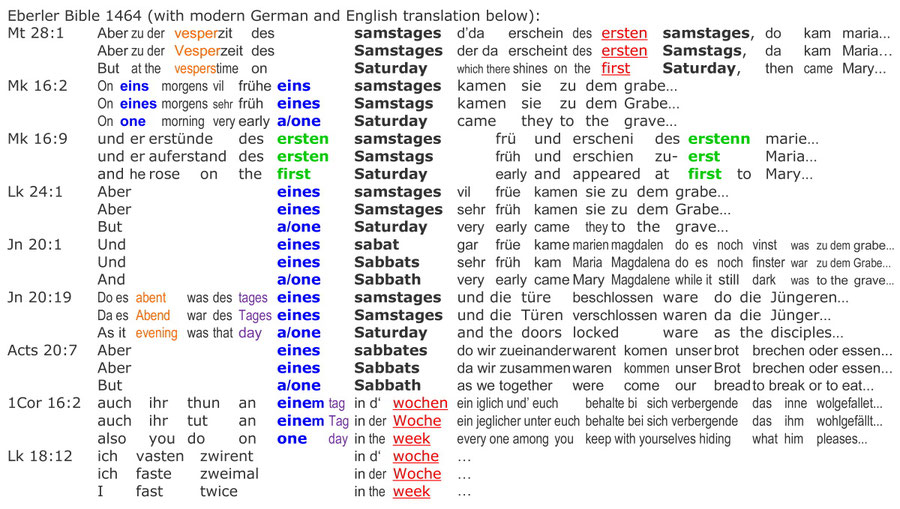
German Bible - Mentelin Manuscript 1466-1471
This German Bible manuscript is sensational (German: Deutsche Bibel, Mentelin-Handschrift; info and facsimiles). Although Hieronymus did not know that Matthew was speaking of a brightening on the Sabbath day (the exact transition from the dark phase to the light phase on a Sabbath or Saturday), thus forming an unclear Latin phrase, the translator of the German Bible nevertheless renounced his own opinions and translated them correctly. The translation from the Vulgate is excellent and can very well distinguish between "one" and "first" and mentions the Saturday as the resurrection day of Jesus in all places. Funnily enough, some theologians are trying to convince us today that the Vulgate would supposedly speak of "a Sunday": but the theological wishful thinking is greater than reality. The truth can be found in this Catholic Bible. Already 500 years ago people knew what only very few know today in the information age what this German Bible says: The resurrection of Jesus Christ "on a Saturday morning" and Jesus appeared to the disciples in the evening of the same Saturday (not Sunday). Any more questions?
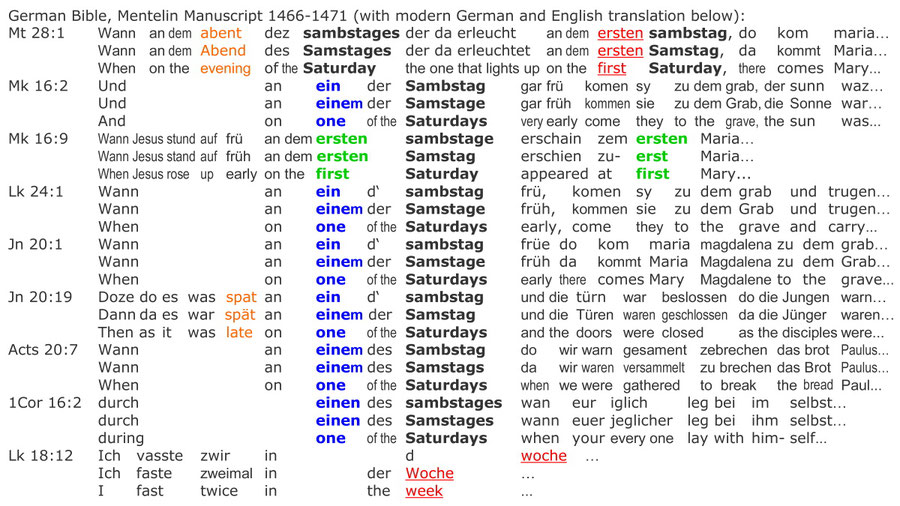
Note: A similar text was published in a national language in the first World Printed Bible, namely in the Mentelin Bible of 1466 see German Bible Prints 1.
The Berlin Gospels from around 1470
The "Berliner Evangeliar" from around 1470 (info and facsimiles). Berlin has one of the greatest treasures on earth, but only a few people know about it. This old German Gospel in the dialect from Alsace (Elsass; Germany at that time, now France) has been excellently translated into German. There is a small inaccuracy in Mt 28:1, because the writer was not aware that Matthew spoke of the transition from the night phase to the day (light) phase on the same Saturday/Sabbath and not of the Vespers time (afternoon). In Mk 16:1 the translator speaks of the passed Sabbath ("and when the Sabbath had passed, Mary came... and they bought ointments..."). Because of this, he speaks in Mk 16:2 of a "different" or "other" (andern) Sabbath. This is very remarkable, because although this is not literally translated, the content is still completely correct, because this man understood that the Sabbath on which the women rested was a yearly Sabbath (Nisan 15) and the other following (Mk 16:2,9) was another weekly Sabbath (Nisan 17). A very clear statement. He did not, unlike many after him, add the word "after" (the Sabbath) to the Bible, but spoke of the coming of women "on another Sabbath". Every little German child can understand the powerful statements in this Catholic Gospel, for it speaks of the resurrection of Jesus "on a Saturday/Sabbath" (or "on the first Sabbath" of the seven Sabbaths until Pentecost; Mk 16:9) and not on an alleged "first day of the week" or "on a Sunday." The words one/first appearing in Greek and Latin have been translated exactly. It is one of many examples that experts can correctly translate the Greek and Latin text, if they really want it and that they can work without falsifications of the Word of God caused by church interpretations. The translator has been dead for over 500 years, but his words still live today. He will be praised by God at the resurrection because (unlike some pastors and seducers of today) he did not falsify the Word of God and kept the Resurrection Saturday or Resurrection Sabbath. The city of Berlin is not aware of the great treasure it possesses. This gospel is priceless and its Catholic text belongs in every school and every church:
Gospel Book from Salzburg ca. 1475
This manuscript (Gospel Book; German: "Evangelistar aus Salzburg"; info and facsimiles) from the second half of the 15th century contains sermons and translates the Vulgate excellently. The text recalls the evangelist from the 13th/14th century. On folio 133v there is a note on Bernhard von Gottesgnaden (von Rohr), the bishop of Salzburg from 1466 to 1481. This bilingual edition contains the Latin texts "una sabbati" and among them the German equivalent "on a Saturday". This Catholic script also proclaims the resurrection of Jesus "on a Saturday" morning and not the day after (on a Sunday). It does not count what people preach, it counts only what is written in the Word of God, which has a clear statement: Yes, Jesus rose from the dead "on a Saturday" morning. This is written in very many old Catholic Bibles:
Conclusion:
As could be clearly shown, all these very precious handwritten German Bibles proclaim nothing other than the resurrection of Jesus "on a Saturday" morning, "on a Sabbath" morning or "early on the first Saturday", namely the first of the seven Saturdays/Sabbaths until Pentecost. These are clear statements in all these wonderful Catholic Bibles. So the Sunday resurrection of Jesus is nothing but an ancient fairy tale that has nothing to do with the Bible. This is proven by these many Bibles. The Germans have always translated the Bible excellently and have spread the gospel in the manuscripts and printed Bibles. But the theologians have twisted the Word of God and so cleverly reinterpreted it that even the "Church of God" and Seventh-day Adventists (including Ellen White) have fallen into this Sunday trap (see church opinions).
The German printed Bibles also teach the Sabbath resurrection!
In the second part the German printed Bibles before Luther (Link) and printed Bibles since Luther (Link) are presented. Like the manuscripts, the latter show the same content and the resurrection of Jesus "on a Saturday" or "on a Sabbath" morning.
Numerous Bibles in many languages show the resurrection of Jesus on a Sabbath morning:
7. Many old Bibles proclaim the resurrection of Jesus on a Sabbath or Saturday morning
7.1 Greek Bibles show the Sabbath resurrection
7.2 Latin Bibles show the Sabbath resurrection
7.3 Gothic Bibles show the Sabbath resurrection
7.4.1 German Bible manuscripts show the Sabbath resurrection
7.4.2 German Bible prints 1 (before Luther) show the Sabbath resurrection
7.4.3 German Bible prints 2 (since Luther) show the Sabbath resurrection
7.4.4 German Bible prints 3 (since 1600 to 1899) show the Sabbath resurrection
7.4.5 German Bible prints 4 (since 1900) show the Sabbath resurrection
7.5.1 English Bible manuscripts show the Sabbath resurrection
7.5.2 English Bible prints 1 (from 1526 to 1799) show the Sabbath resurrection
7.5.3 English Bible prints 2 (from 1800 to 1945) show the Sabbath resurrection
7.5.4 English Bible prints 3 (from 1946 to 2002) show the Sabbath resurrection
7.5.5 English Bible prints 4 (from 2003) show the Sabbath resurrection
7.6 Spanish Bibles show the Sabbath resurrection
7.7 French Bibles show the Sabbath resurrection
7.8 Swedish Bibles show the Sabbath resurrection
7.9 Czech Bibles show the Sabbath resurrection
7.10 Italian Bibles show the Sabbath resurrection
7.11 Dutch Bibles show the Sabbath resurrection
7.12 Slovenian Bibles show the Sabbath resurrection
"Prove all things; hold fast that which is good. Abstain from all appearance of evil"
(1Thess 5:21-22)
"Take no part in the unfruitful works of darkness, but instead expose them"
(Epheser 5:11)

